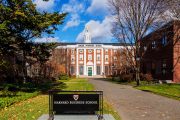
Yesterday evening at 6 p.m., President Obama held the first ever “beer summit” at the White House, which wasn’t really a “summit.”
President Obama, Harvard’s Henry Louis Gates, Jr., and Sgt. James Crowley of the Cambridge Police Dept. — joined at the last minute by Vice President Joe Biden — sat across from one another at a table in the Rose Garden behind the White House to discuss their differences.
Both Gates and Crowley brought family members from Cambridge, including Gates’s elderly father, Henry Louis Gates, Sr. The families toured the White House as the meeting commenced.
The meeting, which lasted 40 minutes, was visible to the media only from a distance. The men could be seen chatting, with four mugs — Biden’s drink was nonalcoholic — and snacks in front of them. Both Crowley and Gates were dressed in formal attire, wearing suits and ties, while the president and Biden wore plain shirts.
The president had earlier said, “I noticed this has been called the ‘beer summit.’ It’s a clever term, but this is not a summit, guys. This is three folks having a drink at the end of the day and hopefully giving people an opportunity to listen to each other.”
On July 16, Crowley had arrested Gates on a disorderly conduct charge on his own property after the black scholar flew into a rage and accused him of racism. The charge was dropped the next day. Crowley, who had been responding to a call on a potential break-in, maintained he had done nothing improper in demanding that Gates identify himself. His colleagues and superior including minorities on the force supported him.
The issue was mainly only of local interest until the president weighed in with the allegation that Cambridge police had “acted stupidly” in arresting Gates, who is an acquaintance of the president. This provoked an uproar from police departments and organizations. Obama did not apologize, but retreated with an admission that he could have chosen different words.
Phone conversations between the president and each of the two men led to their agreement to hold the White House meeting to discuss their differences. A 10-day blitz of news coverage ensued, distracting the president from his agenda for healthcare. Just prior to the meeting, Obama observed that he was “fascinated by the fascination about this evening.”
The "summit," however, wasn’t the first time Gates and Crowley had communicated since the incident. Obama said, “Even before we sat down for the beer, I learned that the two gentlemen spent some time together listening to one another, which is a testament to them.”
“We hit it off right from the beginning,” Gates concurred, adding sardonically, “When he’s not arresting you, Sergeant Crowley is a really likable guy.”
At a news conference after the meeting, Obama told those assembled, “I have always believed that what brings us together is stronger than what pulls us apart. I am confident that has happened here tonight, and I am hopeful that all of us are able to draw this positive lesson from this episode.”
Crowley was quietly reflective. “I think what you had today was two gentlemen who agreed to disagree on a particular issue,” he said. “I don’t think that we spent too much time dwelling on the past. We spent a lot of time discussing the future. We agreed to move forward.”
Gates concurred, stating his hope for an “occasion of education, not recrimination.” He proposed wider national awareness of the different perspectives of police and members of the black community. “It is incumbent upon Sgt. Crowley and me to utilize the great opportunity that fate has given us,” he said. He spoke of fostering sympathy among Americans for “the daily perils of policing, on the one hand, and for the genuine fears of racial profiling on the other.”
Both Crowley, who has team-taught a course about racial profiling with a black officer at the Lowell Police Academy for five years, and Gates, who directs the W.E.B. DuBois Institute for African and African-American Research at Harvard University, said they plan to meet again for future talks.
The president will not, of course, participate in those talks. The economy, the declining value of the dollar, and the future of healthcare in America are, after all, problems that will affect all Americans in one way or another regardless of their race/ethnicity.
Photo: AP Images




